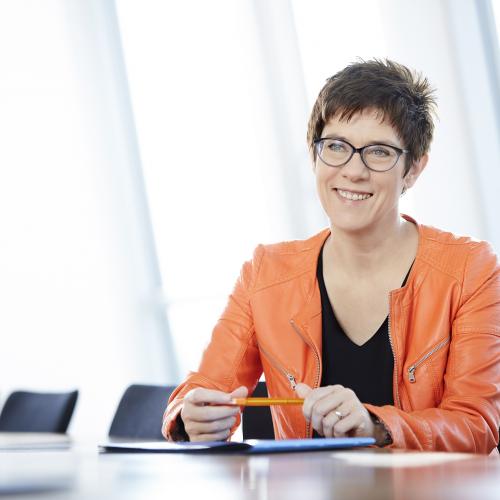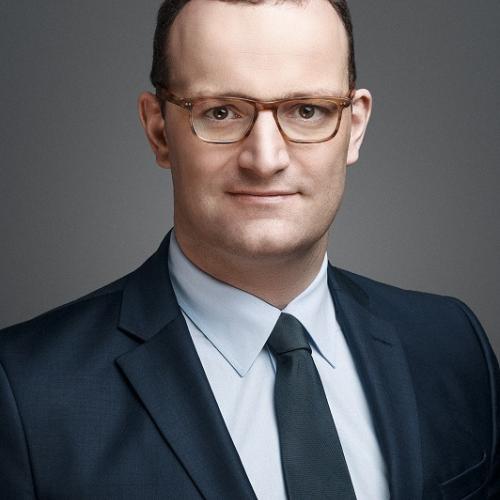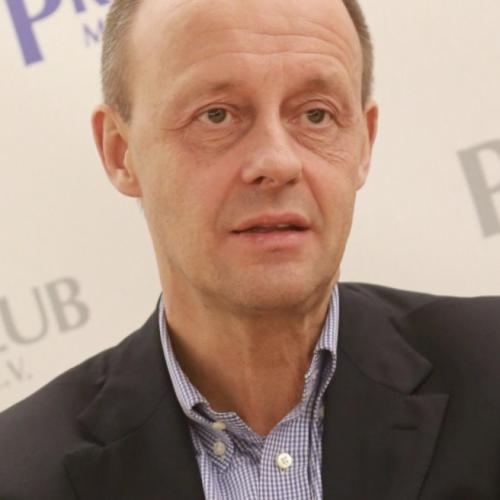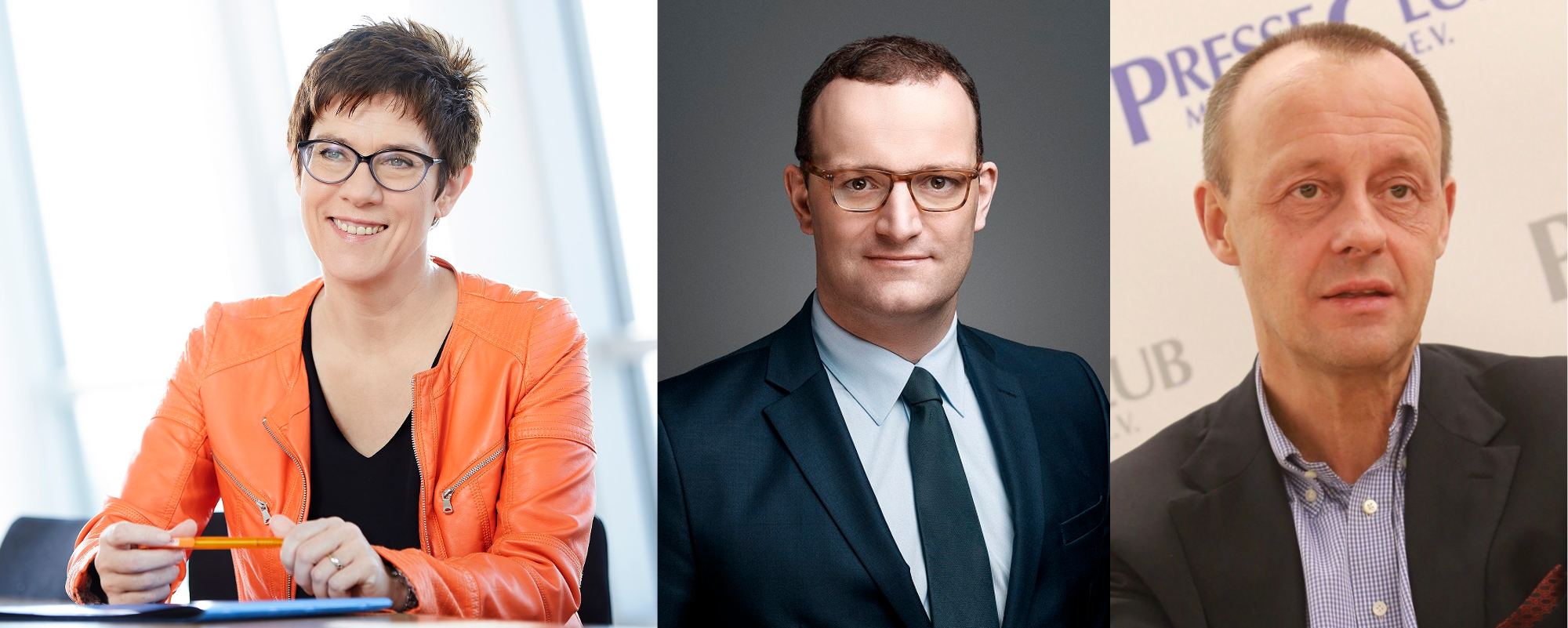Climate and energy views of candidates to follow Merkel at helm of CDU
After heavy losses for her conservative Christian Democratic Union (CDU) in the federal states of Bavaria and Hesse, Chancellor Angela Merkel announced that she will clear the way for a new leader of her conservative CDU party and not run for re-election at the party conference on 7-8 December. [Read the full story here.]
Merkel said that she plans to continue her work as chancellor until the end of the legislative period in 2021. Whether this will be possible under new party leadership depends on the successor.
Party delegates will vote on the succession on 7 Dececember following speeches of Merkel and the three candidates. Results are expected around 16:00 CET.
Campaign and election procedure
The CDU leadership decided to give the three candidates most likely to become Merkel's successor the opportunity to introduce themselves to CDU members at eight regional conferences from mid to end of November, where each candidate had time to say a few words and then answer questions. Additional candidates can be proposed at the CDU party conference in December by members eligible to vote. This leaves open the possibility of spontaneous candidacy.
Kramp-Karrenbauer sets herself apart from other CDU leadership candidates on climate action
Annegret Kramp-Karrenbauer has warned that Germany must not lag behind on fulfilling its own climate goals. “We have only one climate on this planet. Germany alone cannot save it,” she said at the regional conference in Düsseldorf, North Rhine-Westphalia. “But I warn that we must not start a debate now along the lines of ‘let the others save it’. [...] I do not believe this would do justice to the leadership role of Europe and Germany in the world.” The comment set her apart from the two other contestants, Friedrich Merz and Jens Spahn. Spahn said that Germany exiting diesel, coal, and nuclear energy “does not solve the actual global CO₂ issues,” as the country was responsible for only a small part of global emissions.
Until the Düsseldorf event, the three candidates had shown hardly any difference regarding their views on climate and energy during the regional conferences. In a telling example, Annegret Kramp-Karrenbauer answered the only audience question on the energy transition at the conference in Idar-Oberstein on 21 November (see below), while the other two candidates simply said they had nothing to add.
In a recent poll commissioned by public broadcaster ZDF, 30 percent of respondents said Annegret Kramp-Karrenbauer should become the next CDU head, while 24 percent named Friedrich Merz and only 6 percent Jens Spahn. Among CDU supporters, the numbers were 38 percent (Kramp-Karrenbauer), 29 percent (Merz) and 6 percent (Spahn). Even if the chairman is elected by the delegates at the party congress, the opinion of the general public plays a role in their decision, as does that within the CDU's constituency.
This article will be updated as candidates emerge and comment on climate and energy issues.
Annegret Kramp-Karrenbauer, CDU general secretary:
The former state premier of Saarland, the small Western German state bordering France and Luxemburg, is a close Merkel ally and has been seen by many as a likely candidate to follow her as chancellor since she was elected CDU general secretary in February 2018. Energy and climate policy has not been a focus for the 56-year old Kramp-Karrenbauer but she is seen as a talented all-rounder.
As the CDU’s general secretary, Kramp-Karrenbauer is currently responsible for creating a new basic policy programme for the CDU by 2020. Of all the potential candidates, she is likely to provide most continuity and embody what many see as Merkel’s relatively liberal policy direction.
In the end, we will only succeed if we create a blueprint that shows you can have a strong economy and industry even without nuclear power and in a CO₂-friendly way. That is the great art of the energy transition.

Climate and energy views:
- In the political TV talk show “Anne Will” by public broadcaster ARD, Kramp-Karrenbauer said it would be “too radical” to withdraw political support for the Russian-German gas pipeline project Nord Stream 2 as a reaction to Russia’s actions near the Crimea region. However, Germany could look at reducing the amount of gas to flow through the pipeline. The increased conflict put the European discussion about the political implications of the pipeline back into focus, she said.
- At the regional conference in Düsseldorf, she said Germany has a leadership role in the world on climate protection. “If Germany cannot prove that climate protection, new technological developments, and industrial strength can be brought together – frankly I don't see many countries in the world that can." She warned that Germany must not lag behind on fulfilling its own climate goals. “We have only one climate on this planet. Germany alone cannot save it,” she said. “But I warn that we must not start a debate now along the lines of ‘let the others save it’. What is an emerging or developing country supposed to think when we demand of it to adhere to the [Paris] climate agreement, while we as a strong and rich industrial nation say we can’t do it at home. I do not believe this would do justice to the leadership role of Europe and Germany in the world.” “I would be happier if the French phased out their nuclear power. But in the end, we will only succeed if we’re not content with exiting nuclear ourselves while everyone around us stays in. We will only succeed if we create a blueprint that shows you can have a strong economy and industry even without nuclear power and in a CO₂-friendly way. That is the great art of the energy transition.”
- At the same conference, Kramp-Karrenbauer said the German energy transition in the past had seemed like an unsolved puzzle to her, where the pieces still had to be placed right to create the whole picture. Renewables expansion had to be regulated with market economy instruments and it had to be coupled with grid expansion. Heating and the mobility transition had to be aligned with the energy transition as well. Regarding the coal exit, she agreed with rival candidate Friedrich Merz that an alternative energy source needed to be at hand to ensure supply security for the country’s industry.
- She also pointed to the government's responsibility for workers: “Behind terms such as kilowatt hours and tons of CO2 there are always the workers and their families. The people who work in the energy industry today, including coal, deserve that we represent their interests with as much passion as we do in climate protection.”
- Asked about Germany's energy supply in the regional CDU conference in Idar-Oberstein on 21 November, she said: “We must choose an exit from coal that ensures that it can be replaced by baseload capacity, either by gas or by other storage options. I want to say this in particular with regard to the affected areas, especially in eastern Germany. We here in the region know what structural economic change means. It must always take place in such a way that it is socially acceptable and we keep an eye on the jobs. If there is a big difference between the Greens and us, then that they say - for example regarding the Hambach Forest "What do we care about the 6000 people whose lives depend on it. We just want to get out." That is not our position. We are also responsible for these people and their families. That must go hand in hand. And if it takes a little longer, then the process has to be stretched out a little.”
- In the political talkshow maybrit illner by public broadcaster ZDF, Kramp-Karrenbauer gave her view on renewables support: "At the outset, we pushed subsidies for renewable energies to very high levels to get the expansion going. In the meantime, this has become degressive. Nevertheless, energy prices in Germany are very high and it must also be a task in view of the energy transition to reduce this burden - both for individual consumers and for industry, which is dependent on energy. Otherwise we will damage our competitiveness."
- Kramp-Karrenbauer has warned of overambitious climate targets. In 2017, she said: “If it is necessary to jeopardise the basis of our prosperity with an insecure and overpriced energy supply in order to achieve the 40 percent target, then, as premier of an energy- and industry-oriented federal state, I would be of the opinion that it would be better to achieve 38 percent than to risk the energy supply with 40 percent.”
- In a 2015 interview, she said that the Paris Agreement goal of limiting global warming to 2° Celsius (the agreement’s less ambitious target) was “very ambitious” in light of the widely varying interests of governments around the world. She said she was against setting very ambitious goals if poor countries in particular were likely to struggle to achieve them. She warned against setting an excessively high target that would later have to be abandoned.
- In a 2018 interview, Kramp-Karrenbauer said, “The question is, how do you define conservative? Is nuclear energy conservative? I am considered conservative in socio-political terms, but I've never been a proponent of nuclear energy.”
Jens Spahn, health minister:
German health minister and Merkel critic Jens Spahn has largely focussed on finance, budget and health policy during his career, but began to comment on a wider range of topics ahead of his appointment as a federal health minister at the beginning of 2018. Still, he has made little comment on energy and climate policy. Spahn became a member of the Bundestag in 2002 and worked his way into the CDU leadership by the early 2010s. He was parliamentary state secretary in the finance ministry from 2015 to 2018.
Spahn, aged 38, is savvy of the power of social media and a frequent guest on political talk shows. He has close ties to controversial US ambassador to Germany Richard Grenell. He stands for a new – and more conservative – beginning for the CDU and for a generational transition. He has many supporters in the Junge Union, the CDU’s youth wing.
Politics will eventually become dysfunctional if it only looks at targets. Yes, we want CO₂ reduction, yes, we want environmental protection, but we must do this with a political approach and not by always just staring at dates and numbers.

Climate and energy views:
- At the regional conference in Düsseldorf, Spahn said the Green Party’s climate policy is often too national. Germany exiting diesel, coal, and nuclear energy “does not solve the actual global CO₂ issues”. “We carry out our measures, save nothing with them, and endanger thousands of jobs here in North-Rhine Westphalia as well as in Lusatia and in central Germany.” In cooperation with other countries, we could do more with every euro invested, he said.
- At the same conference, he criticised constantly setting goals without saying how to get there. "Politics will eventually become dysfunctional if it only looks at targets. Yes, we want CO₂ reduction, yes, we want environmental protection, but we must do this with a political approach and not by always just staring at dates and numbers."
- In a recent interview with public broadcaster ZDF, Spahn called for debate over and issues that have a concrete impact on the lives of German citizens, such as the energy transition. He added, with a nod to events surrounding the Hambach Forest and the debate over the lignite mine extension, that politicians must provide solutions that meet the triple goals of climate protection, jobs and affordability.
- Spahn has repeatedly made clear that he would favour cooperating with the economically liberal Free Democrats (FDP), rather than the Green Party. Spahn has been full of praise for how FDP head Christian Lindner brought his party back from federal insignificance. In 2014, however, Spahn and Green politician Omnid Nouripour organised a meeting with young members of both parties to open communication channels with the aim of making possible future coalition talks easier. Ahead of the 2017 elections, Spahn said he favoured a three-way coalition with the FDP and Greens over a renewal of the grand coalition with the Social Democratic Party (SPD).
- During the coalition talks following the federal elections, Spahn told public broadcaster MDR that while his party aimed to reach climate targets, supply security must be guaranteed. "There is little point in shutting down coal-fired power stations in Germany and then importing coal-fired electricity from Poland or nuclear power from France, for example,” he said.
Friedrich Merz:
Merz, who will turn 63 on 11 November, is a long-time rival of Merkel. A business-friendly, socially conservative economics expert, climate and energy policy has never been his specialty. Merkel replaced Merz as CDU/CSU parliamentary group leader in 2002. Merz quit politics in 2009 after five years in the European Parliament and then 15 years in the Bundestag, to work as a private lawyer. A defender of multilateralism, Merz is chairman of the board of directors of Atlantik-Brücke, a non-profit association promoting German-American ties. In 2017, he became chairman of German operations at the world's largest asset manager, BlackRock. His return to politics has prompted watchdog LobbyControl to voice concern over conflict of interest. Since leaving politics, Merz has often criticised Merkel’s policies and remains popular among the CDU’s pro-business camp. The German public remembers Merz for his 2003 tax reform proposal, which he said “fit on a beermat.”
In a press release to announce his candidacy, Merz wrote: “In the [conservative alliance of CDU/CSU], we need a new beginning and renewal with experienced and younger leaders. I am prepared to take responsibility for this and at the same time to do everything I can to strengthen the internal cohesion and future viability of Germany's CDU.
Migration, globalisation, climate change, digitalisation - these are the greatest challenges of our time in my view.

Climate and energy views:
- At the regional conference in Berlin, Merz said he agrees with Merkel that the Russian German pipeline project Nord Stream 2 is “first and foremost an economic decision. However, the more the conflict between the Ukraine and Russia escalates, the more the question comes into focus, whether or not it is right to build this pipeline. Putin has to know that we will at the very least think about this if he continues to act as he does.”
- At the regional conference in Düsseldorf, Merz said that his strategy for reaching the climate targets would be “innovation and new technologies, and not repression and constantly changing regulations.“ On Germany’s coal exit, Merz said that “it’s not so easy to tell the affected people that ‘we’ll just exit now’, and we have a responsibility for the jobs in the regions.” He said that the responsibility for climate protection has to be reconciled with the responsibility for families and jobs. Germany also needed “reliable alternatives” to guarantee supply security for industrial plants.
- When Merz gave first details about his candidacy at a press conference in Berlin on 31 October, he said: “Migration, globalisation, climate change, digitalisation - these are the greatest challenges of our time in my view.”
- Merz has worked for the German Chemicals Industry Association (VCI) in the 1980s.
- He has advocated protecting German industry from the country’s relatively high power prices.
- Merz was one of 40 public figures to sign the 2010 “energy policy call” that said nuclear and coal power would continue to be necessary for Germany. The statement said renewables needed strong and flexible partners: “These include state-of-the-art coal-fired power plants. This also includes nuclear energy, which will enable us to achieve our high CO₂-reduction targets much faster and, above all, more cheaply than if the existing plants were to be shut down prematurely.”
- Merz has warned of an overly hasty energy transition. In a 2011 op-ed for weekly Die Zeit, he criticised the speed with which Merkel’s government decided to shut down several nuclear reactors after the Fukushima disaster. “Those who call for a rapid phase-out must explain what our energy supply should look like in the future,” he wrote, arguing that renewables could not simply replace reliable nuclear power. He also warned that more coal and gas power – which might be needed to replace nuclear – would lead to higher CO₂ emissions. At the time he was not professionally connected to any energy companies, he wrote. In an interview with mass daily Bild on 14 November 2018, Merz said it was correct to exit nuclear power, "but not so sudden and without the necessary discussion."
- In a 2012 interview he said: “My impression is that the energy transition was decided very abruptly and that the timeframe was perhaps too ambitious.”

